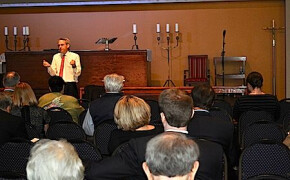The Costly Faith of Abram

The calling of Abram in Genesis 12 is a foundational text for Christians. Abram obeys the voice of God by leaving his country and his relatives, and receives a series of remarkable promises which have proved central to Christians. God promises Abram land, offspring and blessings. He promises Abram that he would be the father of a great nation and that his name would be made great. Then, to top it off, God promises that all the nations of the earth would be blessed through him.
It’s important to note that we are likely supposed to be reading this story in light of the Tower of Babel which immediately proceeds it. Unlike what many think, the building of the Tower of Babel was probably not a prideful attempt to climb up to God; rather, it was more likely an attempt to bring God’s presence down. The people probably constructed a Ziggurat, which was a tower usually built to coax a deity down to receive the people’s worship. In turn, they expected their prayers to be answered. No doubt, their worship left much to be desired, but they were trying to call down the one true God to help them.
Thus, when God promised he would make Abram’s name great, he was issuing this promise in direct contrast to those building of the Tower of Babel, which was constructed to invoke God to promote their own prosperity and to “make a name for themselves.” Abram’s name would be great because of God’s grace, not because of some clever strategy devised to manipulate the deity into making them rich, popular and famous.
On the surface, this seems like pretty straight-forward stuff. Ok, great, Abram’s going to get some kids and some land. But, the details of this story show that God’s promises were anything but straightforward. First, we’re told in the immediately preceding verses that Sarai, Abram’s wife, was barren. The Septuagint, the ancient Greek translation of the Bible used by the early church, played with this by writing, that “Sarah was steira,” the Greek word from which we get “sterile.” Then, a little later, we’re told that Abram was seventy-five years old when he received the command to leave Haran and go to Canaan, site of the Promised Land. That’s right, God promised to make a couple too old to have children the “father of a great nation.” On the surface, this seems almost silly.
But, then, apparently without discussion, Abram left his extended family and went to Canaan, something which would have been considered the very opposite of faithfulness in his culture. Abram knew no one there. Having lived in Ur and Haran, his mother tongue was probably Sumerian, so the proto-Aramaic spoken in Canaan was probably foreign to him. As the book of Hebrews tells us, Abram left “not knowing where he was to go” (Heb 11.8).
Yet it’s also important to point out that Abram’s obedience was uneven. For example, Abram was probably hedging his bet by bringing along Lot, his nephew, whom he could make his heir if the promise of an abundance of offspring didn’t work out.
Moreover, it’s really quite funny that right after Abram makes it to Shechem in the land of Canaan and hears God tell him, “to your descendants I will give you this land,” the first thing he does is to leave! Abram keeps going south until he ends up in the desert wasteland of the Negev (Gen 12.10).
Then, in the very next story when famine hits, Abram leaves the Promised Land entirely and attempts to prostitute his wife to the Egyptian Pharaoh to save his own neck. So much for believing a great nation would come through his wife! This sounds more like a Mel Brooks plot than a pious tale of obedient faith. In reality, Abram was all too human.
I can’t help but be reminded of Jesus’ words to a would-be disciple in the Gospels who wanted to go bury his father (and collect his inheritance?) before following Jesus. Jesus replied, “Leave the dead to bury their own dead; but as for you, go and proclaim the kingdom of God” (Luk 9.60). Two verses later, in response to another recalcitrant disciple, Jesus says, “No one who puts his hand to the plow and looks back is fit for the kingdom of God” (Luke 9.62).
What we learn in this story is that genuine faith keeps growing and developing. But, and here’s the rub, true discipleship is usually very costly. Abram left everything behind to follow the call of God. He sinned grievously along the way, yet became known in Christian circles as a paragon of faith. To me, Abram’s uneven obedience, hedged bets and strange decisions make his faith all the more real.
Don’t let anyone tell you that following Jesus is easy. It’s simply not. To imitate Christ is to imitate one who out of immense love for us left the perfectly satisfying love relationship he had within the Godhead, took on human flesh and identified fully with our human condition. As the author of Hebrews put it, in every respect [Jesus] has been tempted as we are, yet without sin” (Heb 4.15).
Abram wasn’t even close to perfect, but he was faithful. The question for all of us is just how willing we’re going to be to leave behind the acclaim and the comforts of the culture to follow Jesus. Please don’t settle for the lie that this journey of faith won’t cost you something. It always does…
Kevin Dodge is the author of several books about the spiritual life, including Confessions of a Bishop: A guide to Augustine's Confessions and Reading Dante: A Theological Paraphrase of the Inferno. He has an MBA from Harvard Business School and a ThM from Dallas Theological Seminary.

